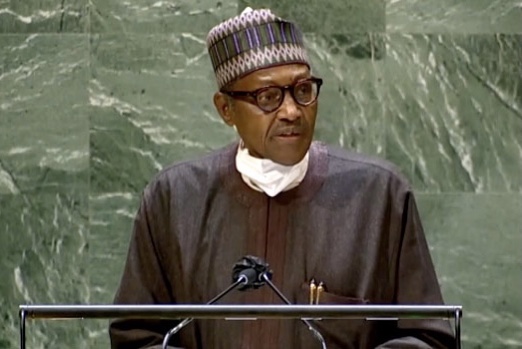There are no products in your shopping cart.
| 0 Items | £0.00 |


PRESIDENT Muhammadu Buhari used his address to the United Nations General Assembly (UNGA) to call earlier today to call on industrialised nations to write off developing nations' debts to enable them recover from the debilitating effects of the coronavirus pandemic.
Earlier today, President Buhari addressed the 76th UNGA in New York, laying the emphasis on economic growth, the Covid-19 pandemic and growing insecurity. In his speech, he thanked the United nations (UN) for appointing Nigerian Amina Mohammed, as its deputy secretary-general and expressed his gratitude to the international community for its commitment to combating the spread of the coronavirus pandemic across Africa.
He, however, added that the pandemic has had a devastating effect on the economies of many developing nations and as such their debts should be wiped off to enable them recover. According to President Buhari, international trade is then engine for development and sustained economic growth, as well as the global eradication of poverty, so dents need to be wiped off to enable commerce to thrive.
President Buhari said: "On the issue of debt, we have seen that developing countries have been faced with unsustainable debt burdens even before the pandemic. The Covid-19 pandemic has increased the risk of a new wave of deepening debt, where vital public financial resources are allocated to external debt servicing and repayments at the expense of domestic health and financing for critical developmental needs.
"I must commend the current initiatives by the international financial institutions and the G20 aimed at significantly mitigating the economic situation of the indebted countries and urge for more efforts in this regard. Therefore, there is an urgent need to consider expansion and extension of the Debt Service Suspension Initiative to include all developing, least developed countries and small island developing states facing fiscal and liquidity challenges.
"In addition, a review of the eligibility criteria for debt suspension, including outright cancellation, is needed for countries facing the most severe challenges. Fair and equitable trade would eventually eliminate the need for aid, as my country and indeed all African countries do not intend to stay indefinitely looking for aid, all we need is a fair and equitable system of international trade.
"We, therefore, call for a reform agenda that will engender better recovery from this crisis, build resilience to future shocks and pursue transformative development strategies that can deliver the 2030 Sustainable Development Goals. The global food system has, in recent times, been impacted by several factors such as population growth, availability and accessibility of arable land and water resources, climate change, and loss of biodiversity."
I addition, President Buhari said Nigeria remains determined to improve the productivity and incomes of small-scale farmers by promoting equal access to land, technology and markets, sustainable food production systems and resilient agricultural practices. He added that at the heart of Nigeria’s post-Covid-19 response is the Economic Sustainability Plan, which has a major component, called the Agriculture for Food and Jobs Programme.
He added that Nigeria remains deeply concerned over the illicit trade, transfer and circulation of small arms and light weapons. According to President Buhari, their excessive accumulation and uncontrolled spread in many regions of the world are having devastating humanitarian and socio-economic consequences, especially on the continent of Africa.
As a result, he called for a worldwide application of the Arms Trade Treaty to codify accountability in the conventional arms trade, which is critical to the security of nations. In addition, President Buhari called for moves to combat illicit financial flows and ensure that the recovery and return of illicitly acquired assets have the potential to provide resources in the immediate term for financing development.